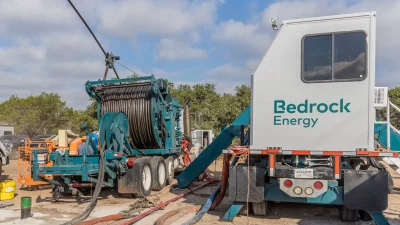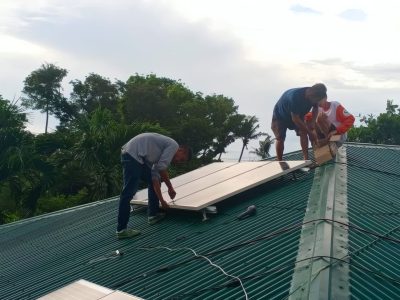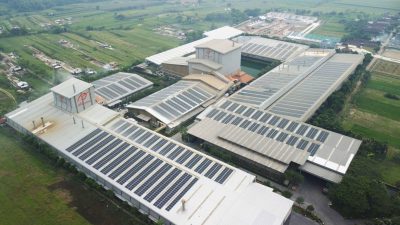Each Earth Day, we’re reminded of the stakes. Wildfires, floods, and rising seas make it obvious that climate change isn’t just a looming threat; it’s here.
But amid the urgency, there’s also momentum on the solutions front—quietly building in labs, garages, solar farms, and startup accelerators around the world.
In over 20 years building ecosystems for climate and clean energy innovation, we’ve seen founders come up with ingenious ideas that are now driving decarbonization. Startups start small but can deliver exponential impact at scale, and we can actually model potential mitigated emissions as they grow (based on factors including current performance, projected growth trajectories, and market penetration rates).
In fact, from our portfolio of nearly 1,500 climate startups and businesses, we’re spotlighting seven that could collectively reduce over four million metric tons of emissions (CO2e) by 2030. That’s the equivalent of taking nearly 59,000 cars off the road. Learn more below.

Photo from Bedrock Energy
Bedrock Energy (United States)
Emissions (CO2e) reduced (2024): 32 tons
Potential emissions mitigated (2025-2030): 212,498 tons
Bedrock Energy is making geothermal heating and cooling viable for buildings in dense cities, through a proprietary drilling and tech platform that cuts cost, space, time, and risk by 3–5x. The company was named one of America’s Top Greentech Companies in 2024 by TIME and Statista. In early 2025, Bedrock raised US$12 million in Series A funding to advance and expand their technology.
Bedrock Energy joined our New York program The Clean Fight’s Food Service cohort, focused on decarbonizing the storage, distribution, and retail of food. On top of matchmaking opportunities, expert insights, and bespoke support services, Bedrock became eligible to receive up to US$125,000 to implement their demonstration project in New York State.

Hive Energy PH installs a 1.7kWh solar energy system for an off-grid community in 2021, then their largest project. Photo from Hive Energy
Hive Energy PH (Philippines)
Emissions (CO2e) reduced (2024): 127 tons
Potential emissions mitigated (2025-2030): 5,703 tons
Hive Energy PH delivers portable solar generators, battery storage, and solar installations to provide reliable, clean power—especially for underserved communities, students, and remote workers.
CEO & Founder Joseph Amiel Camingal first joined our online course with BARAS TBI in July 2020, where he sparked the idea for a portable energy backup solution. Six months later, he entered our Startup Acceleration Program to strengthen his business skills and scale his startup.
Now, Amiel is joining NEXAccelerate Philippines 2025 to further grow Hive Energy PH and expand access to sustainable, dependable energy across the country.
Kazam (India)
Emissions (CO2e) reduced (2022-2024): 35,310 tons
Kazam was founded by Akshay Shekar and Vaibhav Tyagi to make clean mobility more accessible. Today, it’s one of India’s leading EV charging networks—smart, affordable, and built for everyone, from two-wheelers to commercial fleets. With 50,000+ chargers deployed, Kazam is breaking down barriers to EV adoption nationwide.
Through our ElectronVibe program, Kazam partnered with an Indian utility to tackle real-world EV infrastructure challenges, earning first place in the 2022 EV Infrastructure Management Track.
In 2024, Kazam raised US$8 million in Series A3 funding to expand its network and boost its technology.
Sepion (California)
Potential emissions (CO2e) mitigated (2025-2030): 1.4 million tons
Sepion is advancing lithium-metal batteries that boost EV range by 40% and cut energy costs by 15%, using breakthrough membrane technology that protects lithium and integrates with existing lithium-ion manufacturing. In 2023, Sepion also developed an AI-driven liquid electrolyte that reduces EV fire risks.
New Energy Nexus supported Sepion early on through our CalSEED program’s concept and prototype awards, helping de-risk their membrane tech. This support enabled Sepion to retire key technical risks, close an oversubscribed Series A in 2021, and bring on Solvay as a strategic investor.
Solar Run Energy (China)
Emissions (CO2e) reduced (2024): 127 tons
Potential emissions mitigated (2025-2030): 5,703 tons
Li Xia grew up in rural China without electricity—an experience that inspired her mission to bring power to off-grid communities. In 2016, she founded Solar Run Energy, delivering clean, affordable solar solutions across sub-Saharan Africa, from solar lights to full home systems.
In 2022, she launched Solar Media, bringing solar-powered tablets with educational and vocational content to remote Kenyan villages—impacting over 3,000 people so far.
With support from New Energy Nexus, Li gained mentorship, capital access, and a global platform through the NEX COP28 Climate Tech Accelerator to scale her vision.
SWAP Energi (Indonesia)
Emissions (CO2e) reduced (2021-2024): 50,448 tons
SWAP Energi is a pioneering e-mobility start-up focusing on tech-driven swappable energy infrastructure, including portable battery packs, swapping stations, and SMOOT e-motorcycles in Indonesia. The company also developed a user-friendly SWAP Energi app, which helps riders locate stations, track reservations, and receive maintenance alerts.
New Energy Nexus supported them by connecting with investors, assisting with funding documents, and offering acceleration program guidance. As a result, SWAP Energi now operates over 800 swap stations across 14 provinces as of 2023.
Through partnerships with Grab and PLN, SWAP Energi is building an integrated EV ecosystem, advancing the adoption of electric motorcycles in Indonesia’s growing market.

Photo from Xurya Daya Indonesia
Xurya (Indonesia)
Emissions (CO2e) reduced (2020-2024): 225,673 tons
Potential emissions mitigated (2025-2030): 570,252 tons
In Indonesia, high upfront costs have long blocked businesses from switching to solar—slowing progress on climate goals and energy affordability. Xurya Daya solves this with an innovative zero-upfront-cost rooftop solar rental model, enabling commercial and industrial clients to access clean power without capital barriers. Xurya is scaling fast—deploying over 170 projects, and mitigating 225,674MT of GHG emissions since we first supported them.
New Energy Nexus, through its Indonesia 1 Fund, co-invested alongside East Ventures, Saratoga, and Schneider Electric in its US$21.5 million Series A round — the largest Series A funding ever raised by a clean energy startup in Indonesia. They have also received extensive support through programs we operate in Indonesia.
What else can be done?
Strong policy support
Governments must create a more conducive environment for climate solutions through procurement, tax incentives, and regulatory clarity—making it easier for entrepreneurs to start and scale their businesses.
Accessible, early-stage capital
Climate innovation is risky, but necessary. Blended finance, catalytic funds, and climate-aligned venture capital can unlock growth where private capital alone won’t go.
Thriving innovation ecosystem
Accelerators, manufacturing hubs, distribution networks, and cross-border partnerships are essential for solutions to move fast and far.
If you’re an entrepreneur with a groundbreaking climate solution, we’re here to support your success. Explore our programs and subscribe to our newsletter to stay ahead of opportunities in the sector.